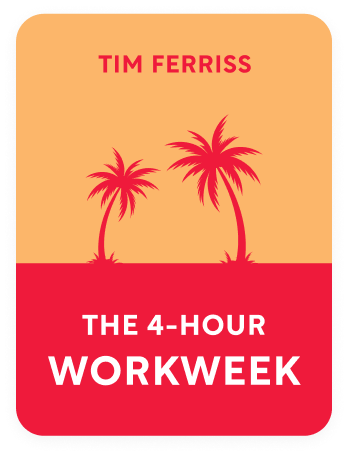

This article is an excerpt from the Shortform book guide to "The 4-Hour Workweek" by Tim Ferriss. Shortform has the world's best summaries and analyses of books you should be reading.
Like this article? Sign up for a free trial here .
What does leaving the rat race mean? How can you liberate yourself from the day-to-day grind of work?
Leaving the rat race is challenging; there’s a reason so few people do it. But it is possible, and takes a lot of planning.
Read more about leaving the rat race and Tim Ferriss’s practice tips from The 4-Hour Workweek.
Leaving the Rat Race: Liberate Yourself
Once your muse is established, it’ll be earning you enough money that you no longer need to work a 9-5 job to bring in income. Quit your 9-5 job to give yourself more time to pursue your dreamlines. This is called leaving the rat race.
You probably have reservations about leaving your job or company. You might think that it’s complicated. Most likely, you’re simply scared. But there are steps you can take to learn how to leave the rat race:
- Quitting doesn’t have to be permanent. The second step of fear-setting is about how to get yourself back to where you were before you quit.
- For example, job search before you quit. Put your resume on job sites and contact friends, family, or headhunters who might have leads. Take a sick day or vacation and search during your usual 9-5 hours because it’s practice for if you were unemployed.
- You’ll be able to pay your expenses. Ideally, you have a new source of income before you quit such as your muse, but if not, you’ll be able to get through it. Consider selling some of your assets or temporarily decreasing your expenses.
- You’ll be able to keep your health insurance and retirement accounts. You can get private medical coverage that covers all the same things your work insurance did for $300-500/month. You can transfer your 401(k) to a different company.
- You can spin gaps in your resume to your advantage. If a job interviewer asks about a gap, tell them an amazing opportunity came up to do something exciting and you had to take it. They’ll probably be so interested that you’ll spend a lot of the interview talking about it.
There are two kinds of mistakes when it comes to quitting your job:
- Doing something. Doing something is a mistake when it doesn’t turn out well because you didn’t know enough before you started. Not a problem. You can recover. Keep making these kinds of mistakes. No one will ever know anything in advance.
- Not doing something. Doing nothing and staying mired in a bad situation is a mistake you make because you’re scared. Don’t let pride or sunk cost keep you from leaving a job you don’t like. Ask yourself if you’re ever going to be able to find what you want in the job you have. Probably, you would have better luck if you moved on. If your industry expects you to “do your time” and put up with a terrible work environment for years, consider switching industries.
Fear-Setting
Leaving the rat race can be scary. It’s the only thing you’ve ever known. You might be scared to go on a mini-retirement or find yourself coming up with excuses not to go. To get past your fears, recall the fear-setting exercise in Chapter 3. You might worry that traveling is dangerous, or fear for your kids if you have them. Here are some common fears and counterarguments:
- Travel is dangerous. Most major US cities have more violent crime than many of the countries the author has visited. Traveling usually isn’t any more dangerous than staying home. Check the US Department of State for travel warnings and avoid places you’re not comfortable visiting.
- My kids might get lost or hurt. A mini-retirement is safer than vacations because it’s more like regular life. On vacations, you’re constantly visiting different, crowded places, and there’s lots of opportunity to get split up.
- If something happens to me, my kids will be on their own. If you’re worried about this, train your kids to be independent. Get them to memorize phone numbers and addresses so they can find their own way.
- My kids might misbehave. If you’re worried about your children’s behavior, bribe them by paying them per hour of good behavior and docking them for bad.
To mitigate these fears for how to leave the rat race:
- If you’re traveling with your kids, take a short, practice mini-retirement first.
- Whenever you arrive somewhere new, organize a week of language classes. Schools will often help you with logistics such as finding an apartment, and you’ll get to know people right away.
Airfare Tips
Because mini-retirements last on the order of months, you’re not necessarily concerned with the low-cost travel associated with binge vacations. Since you’re relocating somewhere for a considerable amount of time, having a less horrible travel experience is probably worth the extra money you spend on a direct flight. It’s always nice to get a deal when you’re leaving the rat race, though, so do the following to save on airfare:
- Buy tickets either three months in advance or at the last minute.
- Leave and come back Tuesday, Wednesday, or Thursday.
- Buy a ticket to the major airport closest to your destination. Once you arrive, buy a ticket to your exact destination with a local airline, which will be cheaper.
- Use a credit card with rewards points for your muse expenses, and then use the rewards for flights.
What to Bring When Leaving the Rat Race
Travel is a good excuse to narrow down your possessions because going away forces you to evaluate what you have—you have to either bring things or store them. It might be hard for you to get rid of things. Capitalism has trained us that if we bought something, it was valuable. But once you get momentum going, it becomes easier to let go of things. Having fewer possessions can also make you happier—less physical clutter means less mental clutter. This can make leaving the rat race much easier.
Don’t bring too much when you travel. How much luggage you have will significantly affect your trip. You’ll have to carry it and store it. Bring only things you really need. The author recommends bringing only:
- A week’s worth of clothing.
- Copies of important documents.
- Debit, credit, and cash in the local currency.
- A lock for hostels and lockers.
- Digital dictionaries.
- A travel guide.
- IF you’re a writer, a laptop. Otherwise, if you need to access your computer while you’re away, use remote desktop software in an internet cafe.
Convince yourself to pack so minimally by:
- Bringing a “settling fund.” A settling fund is money you’ve put away to buy anything you left behind and discover you do in fact need, or to buy anything annoying to bring such as umbrellas or sunscreen. Err on the side of bringing less, because you won’t need as much as you think you do. The author’s settling fund is $100-300.
- Plan on borrowing things. For example, if you’re going on a whale watching tour, someone else on the trip will definitely bring binoculars, so you don’t have to.
Now that you know the steps for how to leave the rat race, you can start making moves to follow your dreams.

———End of Preview———
Like what you just read? Read the rest of the world's best book summary and analysis of Tim Ferriss's "The 4-Hour Workweek" at Shortform .
Here's what you'll find in our full The 4-Hour Workweek summary :
- The 4-step process to live a "retired" lifestyle now
- Find out if you're wasting the best years of your life working a 9-5
- How to create a business that makes you money without sucking up your time






